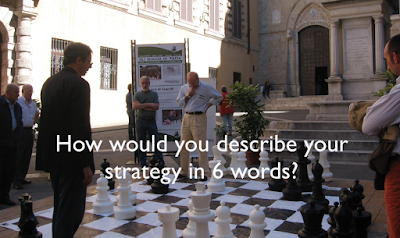This is the fourth in a series of seven about arguably the most powerful philosophy that I work with my clients on. I call it shared-view.
In the workplace to be remarkable we need a shared-view in what I call seven areas of significance: reality, possibility, purpose, strategy, execution, progress, and culture.
Today we're exploring strategy.
Here's the Reality post and podcast.
Here's the Possibility post and podcast.
Here's the Purpose post and podcast.
I’ll be referencing throughout this series a short paper that I published recently about shared-view which you can download here. There's also a designated page at my website where there's short videos on each of the seven.
Strategy
Most organisations have a lot going on. What I observe in most is that there seems to be no guiding light or compass. This is strategy.
Of course many organisations have strategic plans. Mostly they make interesting reading and yet rarely get executed. You’ll find them on a shelf somewhere gathering dust.
I have had to read 100’s of strategic plans over my three decades as a business advisor and mentor, and for a few years I helped to create them.
In the past decade I have partnered with my clients to separate determining strategy from the plans to execute it. I agree with Alan Weiss that strategic planning is an oxymoron!
The great writer Ernest Hemingway thought the following were six of his best words: For Sale: Baby shoes, Never worn.
Inspired by Hemingway, my friend and colleague Kwai Yu, founder of Leaders Cafe, asked the following question on a LinkedIn discussion: Who are you? Could you tell the story of you in six words?
Kwai received hundreds of extraordinary responses which inspired me to think about a way I could best teach people about strategy!
I now work with my clients to help them describe their strategy in 6 words, at the most in a sentence.
Could you describe your strategy in 6 words?
Strategy is the reference point from which we make all decisions about our future direction. It is the guiding light. Tactics are about the what, who, and when. We confuse them at our peril, and to have tactics with no clear strategy means we are going somewhere, however most likely not to the place we really want to go.
High value relationships lead to valuable clients.
This guides everything I do. I consider strategy to be the compass that guides our decisions and execution the map.
Imagine if you asked your employees: What is the company’s strategy for moving forward?
And they could give an answer in a sentence that they believe in!
And imagine too if they had their piece of the execution map on one page.
Well you can make both these dreams comes true. Next Friday I’ll be looking at execution plans on a page.
Recommended Action
For now take your team aside for 20 minutes and ask them to write your strategy in a sentence, compare their insights and then together create your one sentence.
Do Your Work.
Be remarkable.
Ian
PS If you’d like some help please give me a shout. My number is +61 418 807 898.
PSS The folk at six word memoirs are doing some great stuff too.

















